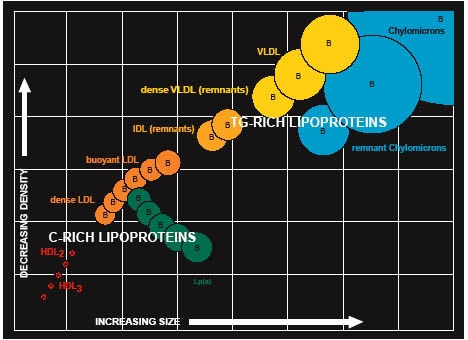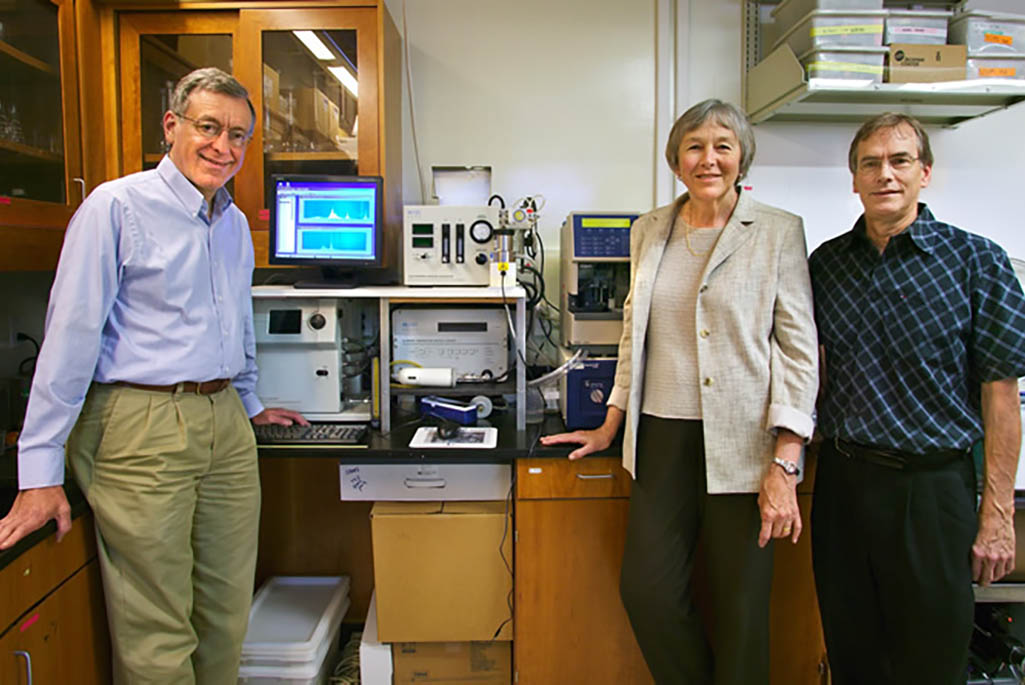Half of the 1.5 million heart attacks in the U.S. each year strike people without symptoms who also have normal levels. Berkeley Lab scientists have now developed a more complete cholesterol assessment test that will help identify individuals like these who may have no idea that they are at risk.

Lipoproteins fall into six major classes, sorted by density and/or size, and each contains several subclasses.
A standard total cholesterol test measures the total amount of fatlike cholesterol in the blood. A standard lipoprotein test (lipoprotein profile or lipid profile) indirectly measures levels of total cholesterol, harmful low-density lipoproteins, beneficial high-density lipoproteins, and triglycerides. For over fifty years, these types of cholesterol testing have been the standard for evaluating a patient’s risk of heart disease. However, they provide limited information and do not make use of recent research on CAD.
Berkeley Lab researchers Henry Benner, Ron Krauss and Patricia Blanche, have recently developed a rapid, direct method of lipoprotein assessment using aerodynamic electrical mobility measurements: Ion Mobility Analysis. In one analytical step performed in only minutes, this technique simultaneously analyzes all classes and subclasses of cholesterol-transporting lipoprotein particles with respect to their number, mass, and surface area. The technology is based on measuring the drift of charged particles as they are dragged through air by the force of an electric field and then determining particle size from drift velocity.

Classical techniques were used to identify five patients in a cholesterol study whose lipoprotein profiles distinguished them as having low, intermediate and high risk for coronary heart disease. The size distributions obtained using ion mobility analysis were in agreement with classical measurements and led to the same risk assessment. Type A profile is indicative of low risk and type B indicates high risk for coronary heart disease. HDL and LDL profiles require separate gel runs to display their distributions. Single aerodynamic mobility measurements reveal simultaneously the size distributions of HDL, LDL, IDL and VLDL particles in a plasma sample.
Berkeley Lab’s Ion Mobility Analysis is the first technology that can measure the size distribution and count the number of individual particles in all classes of lipoproteins. This approach requires no calibration for measuring the size of the particles. Individual particles are counted, thus avoiding the need for stains. In addition, the output is easily interpreted. Scanning across the 5 to 100 nanometer range of electrical mobility, peaks in the particle spectra reveal the particle size and amount of material within specific lipoprotein classes. Doctors are then able to distinguish patients with a high risk of coronary heart disease from those with a low-risk, based on their lipoprotein size distribution spectra.
Research has shown that early diagnosis and appropriate treatment can substantially reduce the risk of cardiovascular disease. Quest Diagnostics, Inc. and Berkeley HeartLab Inc., both licensees of the Berkeley Lab Ion Mobility Analysis technology, are now developing diagnostic products that could make lipoprotein analysis tests as routine as mammograms and basic cholesterol screens are now.
[Editor’s note: Quest Diagnostics introduced its first product based on Berkeley Lab’s ion mobility lipoprotein assesment in 2008.]
